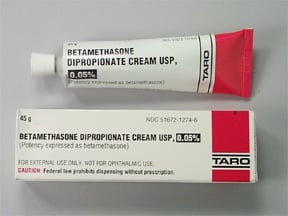
Betamethasone Dipropionate Coupons & Savings Card – Discount Prices from $11.55
Generic for: Sernivo
Betamethasone is a powerful corticosteroid used to treat various skin conditions such as eczema, dermatitis, allergies, and rashes. It effectively reduces inflammation, itching, and redness associated with these conditions. Betamethasone works by decreasing the release of chemicals in the body that lead to swelling and irritation. This medication is available in different forms and should typically be used for no more than two weeks at a time. For individuals aged 18 and older, the Sernivo brand is specifically used for managing mild-to-moderate plaque psoriasis. Always consult with a healthcare professional before starting any new medication to ensure it is safe and appropriate for your condition.
Our coupons are free to use. Before paying, show the pharmacist your Betamethasone Dipropionate savings card to get your free discount. Use our filters below to edit the prescription box to match your needs. The Betamethasone Dipropionate prices will update based on your prescription needs. Above our Betamethasone Dipropionate coupons, you can change your location to see pharmacy prices and costs in other areas. We're here to help you buy Betamethasone Dipropionate at the lowest price with our prescription discount card.
My prescription
Edit
15GM of 0.05%, Betamethasone Dipropionate (1 Tube)
Select pharmacy

CVS
$20.70
COUPON PRICE
Albertsons
$11.55
COUPON PRICE
Walmart
$12.62
COUPON PRICE
Walgreens
$15.68
COUPON PRICEBetamethasone Dipropionate savings card
Show this card to your pharmacist
Albertsons
$11.55
BIN
ID
PCN
GRP
011867
LHC1B434FC
HT
LABH001
Powered by
Betamethasone is a powerful corticosteroid used to treat various skin conditions such as eczema, dermatitis, allergies, and rashes. It effectively reduces inflammation, itching, and redness associated with these conditions. Betamethasone works by decreasing the release of chemicals in the body that lead to swelling and irritation. This medication is available in different forms and should typically be used for no more than two weeks at a time. For individuals aged 18 and older, the Sernivo brand is specifically used for managing mild-to-moderate plaque psoriasis. Always consult with a healthcare professional before starting any new medication to ensure it is safe and appropriate for your condition.
Our coupons are free to use. Before paying, show the pharmacist your Betamethasone Dipropionate savings card to get your free discount. Use our filters below to edit the prescription box to match your needs. The Betamethasone Dipropionate prices will update based on your prescription needs. Above our Betamethasone Dipropionate coupons, you can change your location to see pharmacy prices and costs in other areas. We're here to help you buy Betamethasone Dipropionate at the lowest price with our prescription discount card.
More prescriptions for skin allergy
coupons from$43.03Save 74%
coupons from$233.60Save 74%
coupons from$1.01Save 95%
coupons from$617.96Save 73%
coupons from$1499.11Save 72%
coupons from$1.01Save 94%
coupons from$34.62Save 91%
coupons from$111.14Save 86%
More prescriptions for skin allergy
Fluocinonide Save 74%coupons from $43.03
Eletone Save 74%coupons from $233.60
Phenergan Save 95%coupons from $1.01
Apexicon E Save 73%coupons from $617.96
Atopaderm Save 72%coupons from $1499.11
Dexamethasone Sod Phos +rfid Save 94%coupons from $1.01
Diflorasone Save 91%coupons from $34.62
Cloderm Save 86%coupons from $111.14
Betamethasone Dipropionate dosage forms
Use our Betamethasone Dipropionate 15GM of 0.05% coupon with prices from $12.62 for 1 Tube. You can also use our Betamethasone Dipropionate 15GM of 0.05% coupon with prices from $22.35 for 2 Tubes. We have a Betamethasone Dipropionate 15GM of 0.05% coupon with prices from $25.49 for 3 Tubes.
Dosage Quantity Price from Per unit 15GM of 0.05% 1 Tube $12.62 $12.62 15GM of 0.05% 2 Tubes $22.35 $11.18 15GM of 0.05% 3 Tubes $25.49 $8.50
| Dosage | Quantity | Price from | Per unit |
|---|---|---|---|
| 15GM of 0.05% | 1 Tube | $12.62 | $12.62 |
| 15GM of 0.05% | 2 Tubes | $22.35 | $11.18 |
| 15GM of 0.05% | 3 Tubes | $25.49 | $8.50 |
